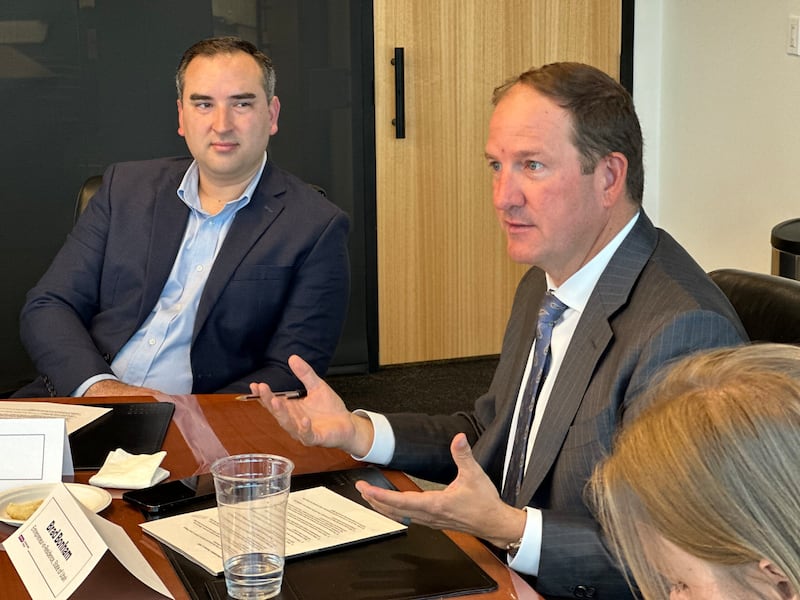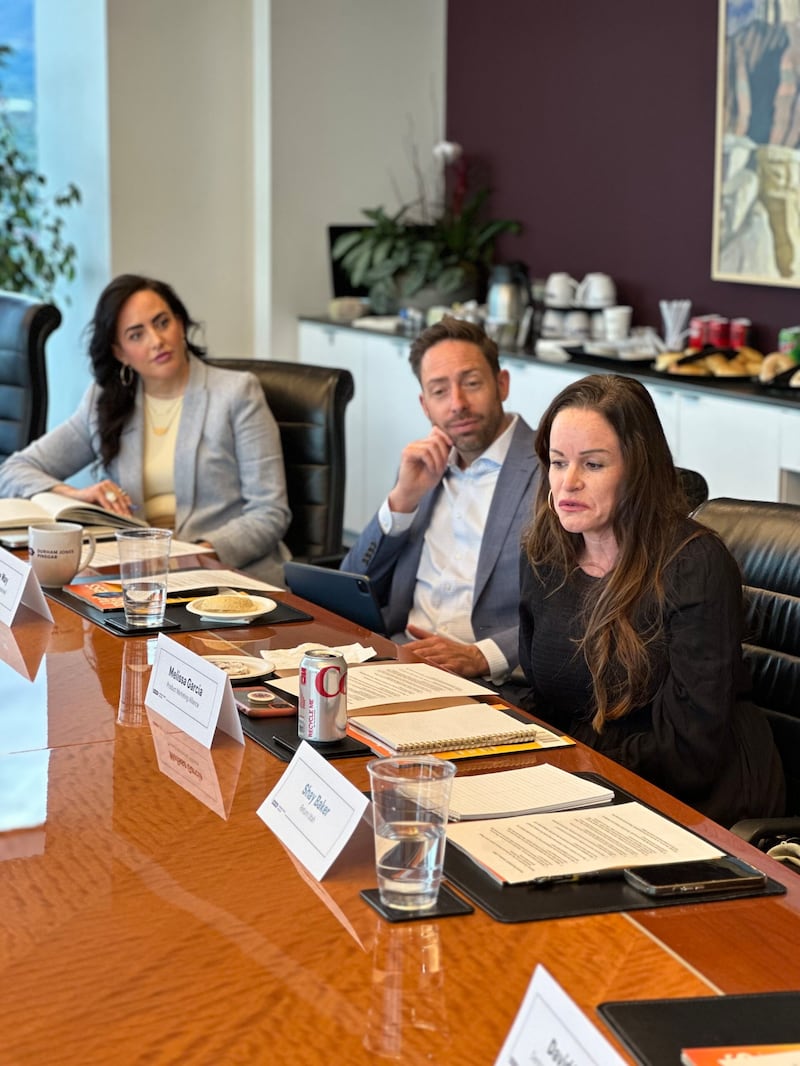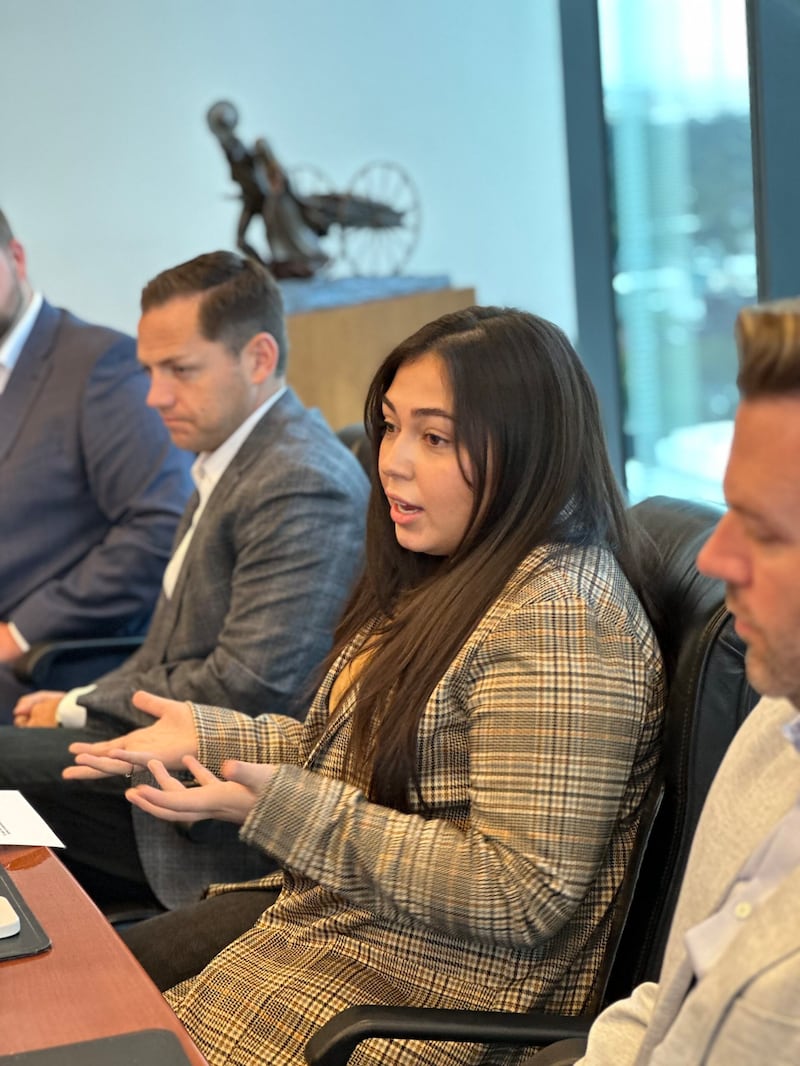Mike May, Melissa Garcia, Shay Baker, David Tufts | Photo by Melanie Jones
Utah Business partnered with Dentons Durham Jones Pinegar this month to host a roundtable featuring Utah business leaders who will present at Utah Business Forward. Moderated by Brad Bonham, entrepreneur-in-residence for the State of Utah, they discussed attracting talent, utilizing artificial intelligence (AI), go-to-market plans, international expansion and more. Here are a few highlights from the conversation.
WalletHub ranked Utah the number one best state to start a business. What do you think makes our business environment special? What resources do we have that other states don’t?
Aaron Starks | President & CEO | Utah Aerospace & Defence
We have several things. One, we’re the youngest state in the nation; we have young families naturally participating in the workforce. Two, we have a great system of higher education that unites companies. We do an excellent job as a state aligning our curriculum requirements with industry standards. Three, over the past couple of decades, we’ve sent a significant infusion of private capital, particularly venture capital, into the economy, which helps companies.
Brandon Fugal | Chairman | Colliers International
One thing that differentiates Utah from the rest of the country and perhaps the world is the emphasis on public-private partnerships. We see unmatched cooperation between Utah’s public and private sectors—that encourages business. We’re witnessing a perfect storm of economic advantages and dynamic market opportunities that will serve Utah well for years if we don’t screw it up.
Natalie Gochnour has talked about Utah’s move to an elite economy and mid-sized state with drastically increasing diversity. What does this new Utah mean for businesses here?
Shay Baker | Program Manager, Return Utah | State of Utah
In terms of diversity, it’s really beneficial. With the program I help run, we find there still are some holes in terms of diversity. We’re still lacking women; we’re still experiencing pay gap issues and things of that nature. When you look at increased diversity, you look at more equalization across the marketplace and within the workforce.
Jim Porter | Sr. Director, Strategy & Operations | World Trade Center Utah
Utah is interestingly international for a landlocked state in the Intermountain West. As we bring in migrants and make it easier for them to integrate into local economies, we will build our local workforces and increase our connections to international markets. Immigrants entering the state can help companies and entrepreneurs access markets outside the country early.
With Utah’s low unemployment rate, how do you attract talent, specifically high-caliber women?
Melissa Garcia | Brand Ambassador & Expert-in-Residence | Product Marketing Alliance
I think one way to do that is through mentorship programs. At my last company, I knew several quiet women who didn’t assert themselves but were extremely talented. I got them into some certifications and met with them weekly. Eventually, they were promoted to several management roles. I target women because I’m a woman. I’m passionate about the female voice in the workplace and their contribution.
Dr. Chelsea Shields | Owner & CEO | Brandthropologie
Women want to return to the workforce after they have kids, but they get lower-paying jobs rather than big, ambitious advancement careers because they’re afraid they can’t balance both. If we allow some flexible work, saying, “We want your talent, but we understand you have other commitments, and we’re willing to work around that,” that’s going to get a lot of women into the workforce.
Shay Baker | Program Manager, Return Utah | State of Utah
If you create innovative programming within your company to invest in good quality talent, and if you show them you appreciate that talent coming in via Zoom, via whatever environment, and provide them opportunities to contribute to a team, you will see the benefits of that in your workforce. What we have seen with Return Utah, in particular, is that people who’ve left the workforce within the state of Utah are highly educated. They have unique perspectives because they’ve taken a break and they’re coming back voluntarily, excited to make an impact. Working with them will boost your business.

Don Willie, Brad Bonham | Photo by Melanie Jones
How do you maintain a strong, cohesive team that pushes the company forward?
David Tufts | Partner | Dentons Durham Jones Pinegar
There’s a strong tendency of traditional practice—to want to be together—and we encourage that. But we also welcome people to have flexibility, to work where they’re from. It builds a cohesive team when people know they’re valued and can get the job done without jumping through the old, formal hoops. The key to making all of this work is to value the contribution. Put people in places of responsibility, and let them shine.
Mike May | Business Development Manager | Air & Sea International
It’s a people-first mentality. My wife has an amazing career, and oftentimes, to support our family needs, I need to have time to take the kids to the doctors or take the day off for sick kids so she can get done what she needs to get done with her job. While we need to lift women and support them in the workplace, I think it’s just a people-first mentality.
What challenges do companies encounter as they build their strategic plans, and how can they overcome them?
Alejandra Salomon | Director, Retention | DIME Beauty Co
We’ve taken an interesting approach this last year at DIME. We’re coming back to the fundamentals of marketing and focusing on retention. Retention marketing, in comparison to customer acquisition, is so much cheaper. It’s cheaper to send an email or text and get your customer back instead of paying an influencer a crazy amount of money to post about a product they probably have never even tried before.
Melissa Garcia | Brand Ambassador & Expert-in-Residence | Product Marketing Alliance
The “shiny object syndrome” is a problem for many companies. They drop what they’re doing and chase another thing and another thing. What’s crucial is the customer being the focal point of anything you do, making sure you’re looking at them quantitatively and qualitatively. Interview them personally, take surveys, talk on the phone, get on sales calls, and really understand who they are, what they want and what they care about. The data is really important because it shows their behavior and direction.
What are your secrets for building successful go-to-market plans?
Alejandra Salomon | Director, Retention | DIME Beauty Co
We’re seeing that customers, whether you’re a small mom-and-pop shop or you’re Amazon, customers expect personalization. They expect you to know their name, what they last purchased and what they want to purchase next. That is the key to getting them back in your doors—a personalized experience.
Dr. Chelsea Shields | Owner & CEO | Brandthropologie
Where we learn the greatest insights is in the makeup bags and closets of our women. Do at-home product ethnography surveys. I worked with a makeup company, and we looked through the makeup bags of women. Why do you buy Yves Saint Laurent for $90 here but also have Wet N Wild here? Some of our greatest insights come from the actual use of our product in the lives of our customers. We can find data that helps us develop new products, see the pain points and create features and benefits that customers love and return to.

Dr. Chelsea Shields, Mike May, Melissa Garcia | Photo by Melanie Jones
Many companies are focusing on performance marketing. Does brand marketing still have a role to play?
Steve Carlile | CMO | CDO
If you’re not designing your brand marketing and performance marketing strategies in a cohesive way, you’re missing the mark. It’s critical that they go together. Now, there are a lot of brands that are having to unwind their overemphasis on performance marketing exclusively. The companies that were quietly, consistently continuing to build their brand identity are in a far better position today than those that leaned exclusively into performance marketing.
What do businesses need to consider as they scale, and how do those considerations change when expanding internationally?
Jim Porter | Sr. Director, Strategy & Operations | World Trade Center Utah
When you’re going international, it’s almost like you’re starting your business anew rather than just extending your business overseas. What I see most companies do and fail at is trying to go too broad too fast. They’re used to the fast pace of growth in the United States and forget that the fourth “P” of go-to-market strategies, especially international, is partners. Your partners make all the difference when you’re starting to scale internationally. When we talk about going international, it’s about slowing down and getting it right before you drive it and go fast again.
David Tufts | Partner | Dentons Durham Jones Pinegar
We’ve got a phrase at Dentons: “in and of the community.” Having someone in a location who is in and of your community is critical. You can’t just move a successful business here overseas; each area is completely different in terms of legal, regulatory and customs perspectives. You need those local people and partners; you’ll have to trust and invest in them. Likewise, they’ll be investing in you. That’s one of the keys to expanding beyond our shores.
Since 2020, executives of all types have had to learn about the supply chain. What common problems do companies experience, and what advice do you have?
Aaron Starks | President & CEO | Utah Aerospace & Defence
Supply chains are too long. With supply chain management, shorter is more efficient and safer. The principle with entering into an international market or with supply chains is that you want to spread your risk. Utah companies realize we’re too highly concentrated in certain areas around the world. When you’re in a partnership with a manufacturer, you’re in a partnership with a distributor, and it’s hard to get out of those. If a factory goes out in China, it disrupts everything globally.
The global environment for startups has been largely friendly in recent years—capital has been accessible, and consumer demand skyrocketed. However, that has leveled off/declined, and capital is harder to obtain. How can companies pivot/future-proof their businesses?
Brandon Fugal | Chairman | Colliers International
Stay lean and scrappy and focus on driving to profitability. It isn’t enough to simply see revenue growth. You have to demonstrate profitability, or you die. In today’s environment, investors are looking for a clear path to profitability and a return on investment.
We’ve seen some big leaps in AI recently. How will this change your realities as entrepreneurs and executives?
Melissa Garcia | Brand Ambassador & Expert-in-Residence | Product Marketing Alliance
AI is a powerful tool in helping you personalize, but not many businesses use it yet. It provides predictive analytics to see the future rather than just the past. At my last company, we combined a lot of data to learn about our customers and predict their next actions. From there, we sent out messages, not necessarily just on the product they wanted, but through the channel they wanted to communicate through.
Mike May | Business Development Manager | Air & Sea International
It’s going to help. It’s going to flatten for global logistics. We’ll all have access to data pretty quickly, so we still have to make human decisions, have human partnerships and have human relationships with our supply chain.
How do we, as founders and businesspeople, help promote and lower the barriers to entrepreneurship across the state?
Steve Carlile | CMO | CDO
I’d love to see the state have a go-to-market plan around entrepreneurialism. Let’s build out a journey map, look at every sector, build out those personas and understand their journey and those interaction points. I know that sounds like an anti-regulation rant, but regulation tends to benefit incumbents and those with the money and resources instead of those trying to start from scratch.

Aaron Starks, Alejandra Salomon, Steve Carlile | Photo by Melanie Jones

